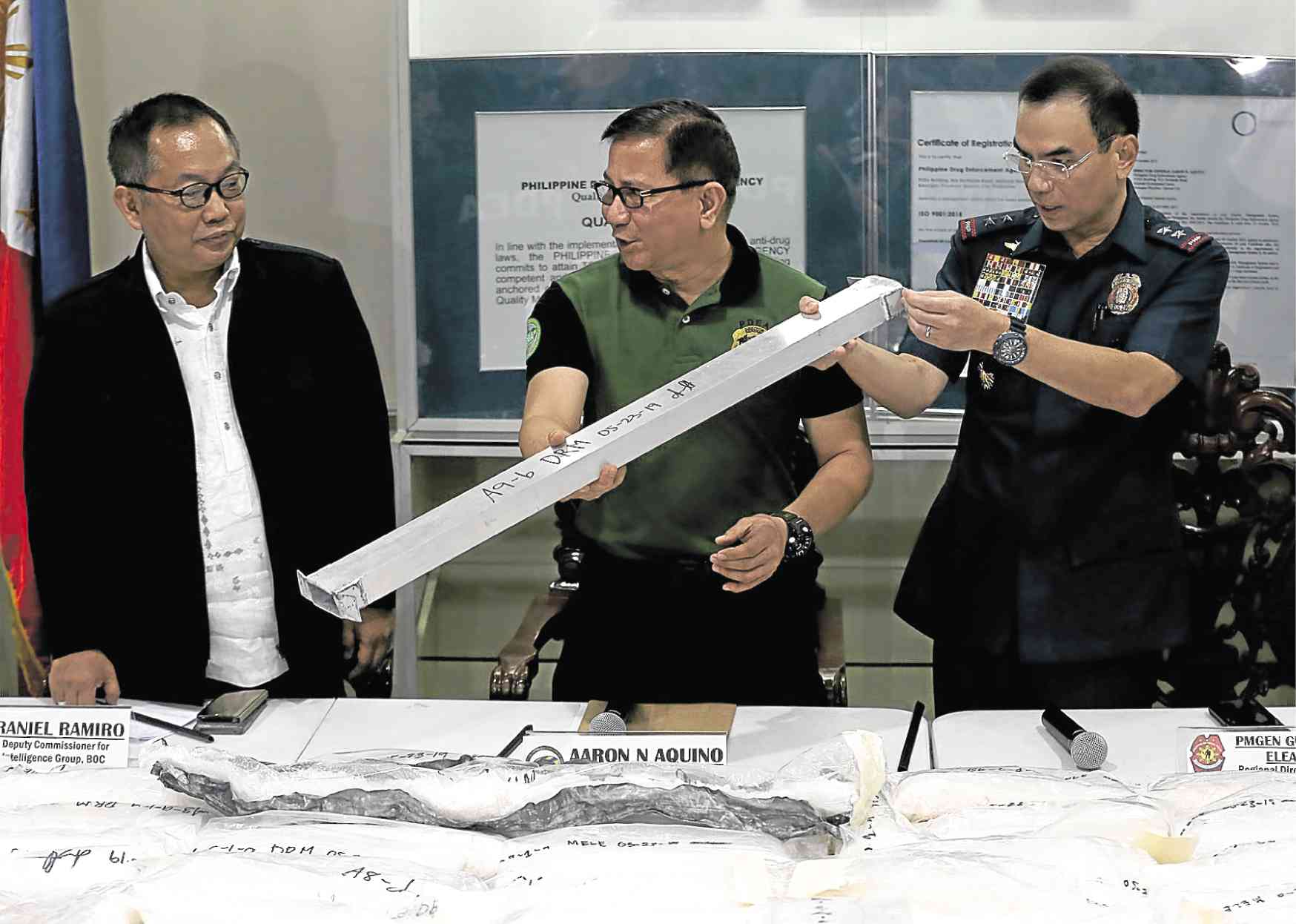Lacson slams clashing PDEA, BOC statements on drug seizure

HOT METAL PDEA Director General Aaron Aquino (center) and Police Maj. Gen. Guillermo Eleazar (right), the NCPO chief, on May 24 show an aluminum pallet containing packs of “shabu” (crystal meth) found in a shipment of tapioca starch. At left is Customs Deputy Commissioner Raniel Ramiro. —RICHARD A. REYES
Officials of the Philippine Drug Enforcement Agency (PDEA) may have pulled a fast one on their counterparts in the Bureau of Customs (BOC) after customs officers claimed they were not aware that the shipment they auctioned off in April contained P1.8 billion worth of “shabu” (crystal meth), Sen. Ping Lacson said on Friday.
Lacson, who on Wednesday delivered a privilege speech on the confiscation of 276 kilograms of shabu and the escape of a Chinese suspected of facilitating the smuggling, slammed the contradictory statements of PDEA and BOC officials on the seizure of the narcotics.
He said the customs officials may have taken back their previous statement after realizing that they could be held liable for violating Section 1139 of Republic Act No. 10863, or the Customs Modernization and Tariff Act (CMTA), which bans the public auction of prohibited goods.
Maybe taken for a ride
“I can only understand [their actions] because they would not want to be charged with violation of the [law],” Lacson told the Inquirer in a phone interview.
Article continues after this advertisement“It’s either that or they did not really know that there were illegal drugs [in the shipment]. Maybe they were taken for a ride by [the] PDEA. That’s the implication,” he said.
Article continues after this advertisementThe official statements of PDEA and BOC, he said, should be congruent since both agencies were involved in the operation.
“Since [the] PDEA maintains that there was an entrapment operation, it could mean [the] PDEA pulled one over the BOC. The implication is that somebody is lying,” Lacson said.
The senator said Joel Plaza, a regional director of the PDEA, issued a report on March 11 stating that the “specimens submitted do not contain any dangerous drugs, controlled precursors and essential chemicals.”
Malabon bidding
Plaza’s report came before the drug shipment was recovered on March 22 in a warehouse of a company in Malabon City that won the bidding for containers of tapioca starch.
“That may be consistent with the report that the discovery [of the illegal drugs] was just an accident. That’s why the winning bidder called the BOC that the container vans did not just contain tapioca starch,” Lacson said.
The customs bureau on Friday insisted that what it put up for auction in April was a shipment of tapioca starch and not shabu.
“As far as the BOC is concerned, what was auctioned [off] in April was tapioca starch, which is highly perishable in nature,” the bureau said in a statement.
It said the bureau and the PDEA discovered the drugs hiiden in aluminum pallets only on May 23, more than a month after the containers of tapioca starch were auctioned off allegedly as part of a sting operation.
“Based on the report submitted by the MICP [Manila International Container Terminal], during the joint operation of the BOC, MICP and PDEA on May 23, authorities discovered that illegal drugs were inserted in 30 aluminum pallets where the tonner bags containing the tapioca starch were placed,” the BOC said.
In a phone interview on Friday, Director Derrick Carreon, chief of the laboratory services and spokesperson for the PDEA, also said the shabu samples from the aluminum pallets were turned over to the PDEA for testing only on May 24.
The only samples tested by the PDEA in March, before the auction, were from the tapioca starch, which tested negative for shabu.
The BOC’s position contradicted the statement of Erastus Sandino Austria, district collector of the Manila International Container Terminal, last week when customs and PDEA agents seized the shipment from the warehouse of Goldwin Commercial, the auction’s winning bidder.
Austria said before the confiscation that they had received information from the PDEA that the shipment of tapioca starch, consigned to Goroyam Trading, may contain illegal drugs.
He said the MICT located the shipment, which arrived from Cambodia on Jan. 27. It was forfeited in favor of the government on March 1 after the consignee failed to file an import entry within the one-month timeline set by the customs bureau, he added.
Austria said the bureau and the PDEA later “jointly inspected the three containers and were able to verify that the shipment indeed contain[ed] illegal drugs.”
Interpol watch list
In his privilege speech, Lacson criticized the two agencies for holding the auction, which he said violated provisions under the CMTA that called for the destruction of the illegal drugs.
He also said the Chinese, Xu Zhijian, was in the country to personally monitor the drug shipment despite being on the Interpol watch list.
According to the senator, Xu, who also used the name Jacky Co, was able to fly in and out of the country and managed to leave for Vietnam via Singapore on April 3, or two weeks after the contraband was seized.
Justice Secretary Menardo Guevarra on Friday said he had ordered the National Bureau of Investigation to separately investigate the drug smuggling.
Guevarra also said the immigration bureau allowed a certain Xu Zhijian to fly to Vietnam on March 20, and not on April 3 as Lacson alleged, because there was no hold departure order nor an Interpol alert against him. —WITH REPORTS FROM JAYMEE T. GAMIL AND DONA Z. PAZZIBUGAN